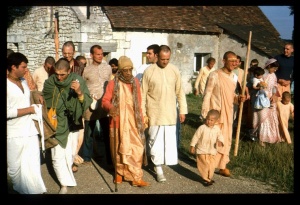CC Antya 1.165: Difference between revisions
No edit summary |
(Vanibot #0054 edit - transform synonyms into clickable links, which search similar occurrences) |
||
| Line 19: | Line 19: | ||
<div class="synonyms"> | <div class="synonyms"> | ||
''ayam'' | ''[//vanipedia.org/wiki/Special:VaniSearch?s=ayam&tab=syno_o&ds=1 ayam]'' — this; ''[//vanipedia.org/wiki/Special:VaniSearch?s=nayana&tab=syno_o&ds=1 nayana]'' — by whose beautiful eyes; ''[//vanipedia.org/wiki/Special:VaniSearch?s=daṇḍita&tab=syno_o&ds=1 daṇḍita]'' — defeated; ''[//vanipedia.org/wiki/Special:VaniSearch?s=pravara&tab=syno_o&ds=1 pravara]'' — best; ''[//vanipedia.org/wiki/Special:VaniSearch?s=puṇḍarīka&tab=syno_o&ds=1 puṇḍarīka]-[//vanipedia.org/wiki/Special:VaniSearch?s=prabhaḥ&tab=syno_o&ds=1 prabhaḥ]'' — the luster of the white lotus flower; ''[//vanipedia.org/wiki/Special:VaniSearch?s=prabhāti&tab=syno_o&ds=1 prabhāti]'' — looks beautiful; ''[//vanipedia.org/wiki/Special:VaniSearch?s=nava&tab=syno_o&ds=1 nava]-[//vanipedia.org/wiki/Special:VaniSearch?s=jāguḍa&tab=syno_o&ds=1 jāguḍa]-[//vanipedia.org/wiki/Special:VaniSearch?s=dyuti&tab=syno_o&ds=1 dyuti]'' — the brilliance of newly painted ''kuṅkuma''; ''[//vanipedia.org/wiki/Special:VaniSearch?s=viḍambi&tab=syno_o&ds=1 viḍambi]'' — deriding; ''[//vanipedia.org/wiki/Special:VaniSearch?s=pīta&tab=syno_o&ds=1 pīta]-[//vanipedia.org/wiki/Special:VaniSearch?s=ambaraḥ&tab=syno_o&ds=1 ambaraḥ]'' — whose yellow dress; ''[//vanipedia.org/wiki/Special:VaniSearch?s=araṇya&tab=syno_o&ds=1 araṇya]-[//vanipedia.org/wiki/Special:VaniSearch?s=ja&tab=syno_o&ds=1 ja]'' — picked up from the forest; ''[//vanipedia.org/wiki/Special:VaniSearch?s=pariṣkriyā&tab=syno_o&ds=1 pariṣkriyā]'' — by whose ornaments; ''[//vanipedia.org/wiki/Special:VaniSearch?s=damita&tab=syno_o&ds=1 damita]'' — subdued; ''[//vanipedia.org/wiki/Special:VaniSearch?s=divya&tab=syno_o&ds=1 divya]-[//vanipedia.org/wiki/Special:VaniSearch?s=veśa&tab=syno_o&ds=1 veśa]-[//vanipedia.org/wiki/Special:VaniSearch?s=ādaraḥ&tab=syno_o&ds=1 ādaraḥ]'' — the hankering for first-class dress; ''[//vanipedia.org/wiki/Special:VaniSearch?s=harin&tab=syno_o&ds=1 harin]-[//vanipedia.org/wiki/Special:VaniSearch?s=maṇi&tab=syno_o&ds=1 maṇi]'' — of emeralds; ''[//vanipedia.org/wiki/Special:VaniSearch?s=manaḥ&tab=syno_o&ds=1 manaḥ]-[//vanipedia.org/wiki/Special:VaniSearch?s=hara&tab=syno_o&ds=1 hara]'' — mind''-attracting; ''[//vanipedia.org/wiki/Special:VaniSearch?s=dyutibhiḥ&tab=syno_o&ds=1 dyutibhiḥ]'' — with splendor; ''[//vanipedia.org/wiki/Special:VaniSearch?s=ujjvala&tab=syno_o&ds=1 ujjvala]-[//vanipedia.org/wiki/Special:VaniSearch?s=aṅgaḥ&tab=syno_o&ds=1 aṅgaḥ]'' — whose beautiful body; ''[//vanipedia.org/wiki/Special:VaniSearch?s=hariḥ&tab=syno_o&ds=1 hariḥ]'' — the Supreme Personality of Godhead. | ||
</div> | </div> | ||
Latest revision as of 19:25, 19 February 2024

A.C. Bhaktivedanta Swami Prabhupada
TEXT 165
- ayaṁ nayana-daṇḍita-pravara-puṇḍarīka-prabhaḥ
- prabhāti nava-jāguḍa-dyuti-viḍambi-pītāmbaraḥ
- araṇyaja-pariṣkriyā-damita-divya-veśādaro
- harin-maṇi-manohara-dyutibhir ujjvalāṅgo hariḥ
SYNONYMS
ayam — this; nayana — by whose beautiful eyes; daṇḍita — defeated; pravara — best; puṇḍarīka-prabhaḥ — the luster of the white lotus flower; prabhāti — looks beautiful; nava-jāguḍa-dyuti — the brilliance of newly painted kuṅkuma; viḍambi — deriding; pīta-ambaraḥ — whose yellow dress; araṇya-ja — picked up from the forest; pariṣkriyā — by whose ornaments; damita — subdued; divya-veśa-ādaraḥ — the hankering for first-class dress; harin-maṇi — of emeralds; manaḥ-hara — mind-attracting; dyutibhiḥ — with splendor; ujjvala-aṅgaḥ — whose beautiful body; hariḥ — the Supreme Personality of Godhead.
TRANSLATION
" 'The beauty of Kṛṣṇa’s eyes surpasses the beauty of white lotus flowers, His yellow garments surpass the brilliance of fresh decorations of kuṅkuma, His ornaments of selected forest flowers subdue the hankering for the best of garments, and His bodily beauty possesses mind-attracting splendor greater than the jewels known as marakata-maṇi [emeralds].'
PURPORT
This verse from the Vidagdha-mādhava (1.17) is spoken by Paurṇamāsī.